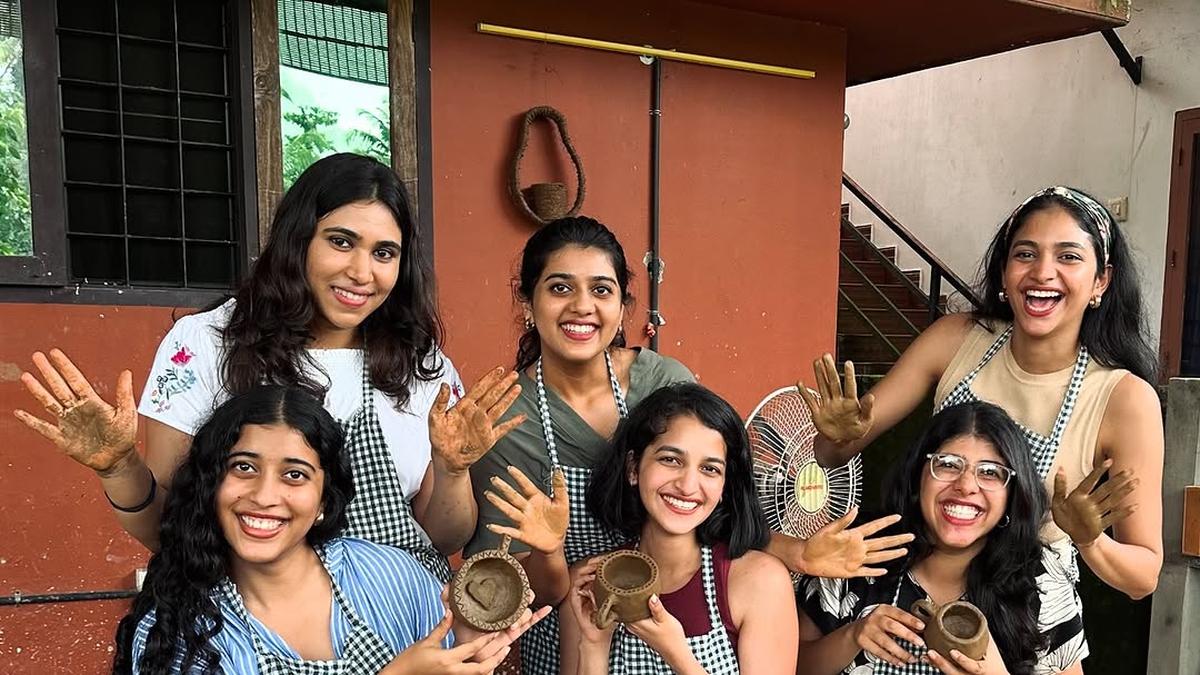Visually-impaired artisans working on creating new clothes at the Little Flower Convent
| Photo Credit: VELANKANNI RAJ B
For over 30 years in the southern town of Mulagumoodu in Kanyakumari, Sornam and Annama have spent their days bent over wooden frames at the Infant Jesus Technical and Educational Institute. An initiative of the Missionary Sisters of the Immaculate Heart of Mary, it is here that the duo and hundreds of others before them learnt convent embroidery, a form of craftwork that involves creating exquisite patterns with threads, drawing from design cards with the Tamil words ‘vadakku’, ‘merku’, ‘therku’, ‘kizhakku’ neatly written on them. Following these simple cardinal points creates filigree lace flowers, vine and jaali work that find their way into extraordinary craft pieces like the Bruges lace sari.
A view of the craftwork on display
| Photo Credit:
VELANKANNI RAJ B
With the opening of a dedicated space at the Little Flower Convent in Chennai, the work of these artisans practising a slowly vanishing craft, is now available through the year. “We, the ICM Sisters, have opened a room to display not just what the lace and embroidery artisans create, but also handwoven products by visually-impaired women. You are not buying a product, but rather supporting an artisan. Earlier, we used to hold exhibitions once a year to showcase their work. But now, the work is for purchase all through the year in a single space,” says Sister Dominic Mary of the Little Flower Convent in Chennai.
Among the products, the single pink lace Bruges sari that we are sitting around, is certainly a conversation piece, or rather a connoisseur’s item. It is a reflection of technique, and craftsmanship; every thread is whimsical, and carries a vintage tale with it.
“To produce a single such sari takes six months and 29 women working eight hours a day. If it’s an urgent order, it will take five months to produce a lacework sari and for that the women work more than eight hours each day,” explains Sister M Arul Sahaya Selvi who oversees the Mulagumoodu project. The delicate lacework and embroidery by these women, also make it to frocks, dresses, saris, handkerchiefs, napkins, table cloth and mats, coasters and even bed linen.
A visually-impaired artisan weaves cloth
| Photo Credit:
VELANKANNI RAJ B
Started by two Belgian nuns Mother Marie Louise De Meester and Mother Marie Ursule in 1897, there were at least 1,000 women back then learning and earning a livelihood through convent embroidery, explains Sister Arul. “The programme was designed for orphaned girls and soon the village women also enrolled in the training programme. The nuns would take finished pieces on their travels and help retail it for them,” she says.
Today, the number of women practising it has dwindled to just over 100. Sister A Mercy who also learnt the skill from a Belgian nun today manages the Palliyadi and Kulasekharam centres in Kanyakumari district. She has trained over 3,500 women since 1964 and elaborates, “these women have been trained in hand embroidery, cut work called Richelieu, bobbin lace, Bruges lace, carrickmacross, petit point work, shadow work and smocking.” The 81-year-old teacher and mentor reveals that the Srivilliputhur centre in Virudhunagar district has been shut down.
“To learn this craft you need time, patience and focus. It’s labour intensive and not many girls these days want to learn it,” adds Sister Arul. “This craft needs undivided attention.On an average the women still practising it are 40 years and above.”
Visually impaired artisans at the Little Flower Convent
| Photo Credit:
VELANKANNI RAJ B
The Government has issued artisan ID cards to these women, once again reiterating that this is a craft of the past that needs support to sustain. “The women are paid by the piece,” says Sister Dominic.
That rare pink Bruges sari is perhaps the only piece in the country; and truth be told, with the decline in the number of lace and embroidery artisans, it may well be the last few Bruges lace saris available this century. So, who is going to take it home?
Available at Little Flower Convent, School for the Blind and the Deaf, 4, GN Road (Near Gemini/Anna Flyover). Between 10am and 5pm.
Published – December 11, 2024 05:11 pm IST





